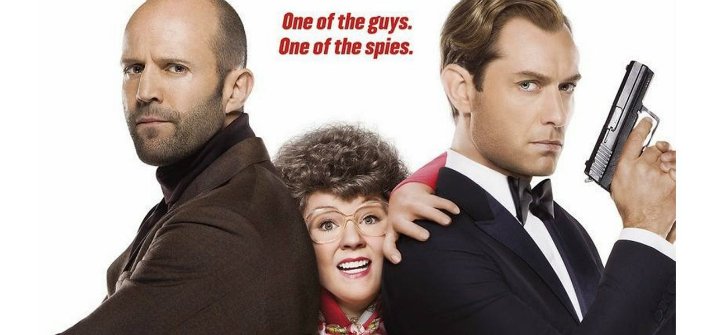Writing a review of a film for which I have no strong opinion is always something of a tedious task, but less than 48 hours after sitting through 20th Century Fox’s Spy, I find myself having trouble recalling more than a handful of moments that truly resonated with me. The film marks the third team-up for director Paul Feig and funny lady Melissa McCarthy – the duo previously worked together on The Heat and Bridesmaids, which served as McCarthy’s breakout role – and the formula is definitely beginning to wear out its welcome.
This time around, McCarthy is Susan Cooper, a CIA agent who spends her time behind a desk as the handler for Bradley Fine (Jude Law), a dashing James Bond clone with whom Susan is smitten. When a mission goes wrong, Cooper volunteers to be sent into the field to clean things up – much to the surprise of her boss (Alison Janney) and Fine’s rival, Rick Ford (Jason Statham).
Cooper is tasked with keeping tabs on the daughter (Rose Byrne) of a wealthy arms dealer as she partners with an intermediary (Bobby Cannavale) to secure the sale of a nuclear weapon. If you’re familiar with McCarthy’s other work, then you can probably guess that she bumbles and fumbles her way through the mission, getting herself deeper entrenched in the dangerous world of espionage.
The film takes a somewhat surprising twist around the halfway point, with Susan’s personality undergoing a dramatic change that makes her interactions with the other characters infinitely more entertaining. This is also around the time that Spy significantly ramps up the action, including a wild chase scene through the streets of Budapest, complete with plenty of mayhem and collateral damage, and a hilarious hand-to-hand combat sequence in a restaurant’s kitchen.
Unfortunately, it takes entirely too long for Spy to get to this point, and sitting through the first hour is an exercise in perseverance. The action scenes and the added humor are a welcome addition, but as with most other movies about secret agents, the third act pulls out a couple of implausible surprises that strain credulity – even for an absurdly comic outing such as this one.
But the biggest problem with Spy isn’t the length or pacing – although both of those are big issues – it’s that most of it feels bland and unimaginative. Take, for example, Susan’s lecherous Italian wheelman (Peter Serafinowicz), who can’t seem to keep his hands from wandering to her breasts and buttocks every few seconds. It’s mildly amusing – if not a little creepy – the first time, but it quickly wears out its welcome by repeating endlessly. It just feels lazy, as if the writers couldn’t be bothered with giving the character any personality traits other than this one.
McCarthy is about as good as can be expected, but she’s not really stretching the limits of her range here, and Law is well-cast as the mischievous and debonair secret agent archetype. But the film’s funniest moments come courtesy of Byrne and Statham, the latter of which is at his absolute comedic best in a role that can only be described as a swaggering, foul-mouthed version of Inspector Clouseau.
Spy is neither a great film, nor a terrible film – it merely exists, and seems to perfectly comfortable with that achievement alone. Moments of vapidity and comic brilliance are doled out in equal measure, with enough to ensure that audiences won’t regret buying a ticket. But they likely won’t be terribly excited about spending that ten bucks, either.
Spy offers moments of vapidity and comic brilliance, doled out in equal measure, and is neither a great film, nor a terrible film - it merely exists, and seems to perfectly comfortable with that achievement alone.
-
Score6




